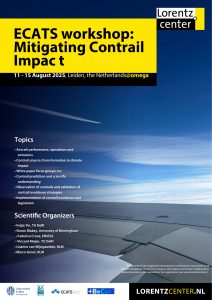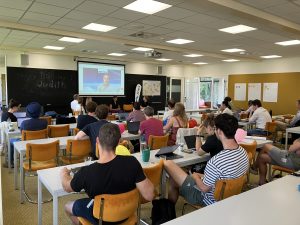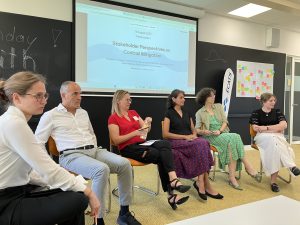 Written by Denis Bilyarski
Written by Denis Bilyarski
The ECATS-BeCoM Workshop on Mitigating Contrail Impact, held from August 11 to 15, 2025, at the Lorentz Center in Leiden, the Netherlands, brought together early-career researchers and experts from academia, the air transport industry, and aviation institutions for a five-day immersive exchange on the evolving subject of contrail mitigation.
The program featured lectures aimed at building a shared understanding of contrail mitigation, covering everything from foundational topics such as engine technology and fuel properties to the more contrail-specific areas of formation dynamics and, crucially, climate impacts. The workshop also included lectures and presentations on weather condition prediction, remote sensing, and in-situ measurements.
The workshop provided a unique opportunity for open dialogue between two groups that don’t often interact directly: early-career researchers and representatives from the aviation sector. Set against an academic backdrop, the conversations were true to the multidisciplinary approach foundational to ECATS, as well as aligned with the BeCoM project’s objectives to bring research insight directly to air transport operations and policy.
While the presence of the European research community was unsurprisingly strong, the response from industry representatives to the workshop invitation and their active participation in discussions was notable. This resulted in a dynamic of open exchange, as many aviation sector representatives have experience in academia or research, while most researchers are well aware of the many operational and economic constraints the air transport industry faces. As an in-person-only event, significant focus was placed on face-to-face interactions, including activities like project poster sessions and a visit to KLM for a hands-on experience with flight dispatch staff.
A highlight was the panel session on stakeholder perspectives, where panelists from TUI, Transavia, DLR, IATA, and EUROCONTROL provided institutional views and personal accounts from contrail mitigation trials. The insights they shared proved particularly useful for researchers exploring which policy components hold the most potential for addressing contrail climate effects.
The workshop also involved establishing three ad-hoc researcher groups to discuss scientific progress and knowledge gaps with the end goal of producing a collaborative white paper on contrail mitigation following its conclusion. Each group focused on one of the following areas:
- Prediction and scientific understanding
- Contrail observation and validation
- Implementation and legislation
Much of the research effort on contrail mitigation aims to advance the implementation of the latest science into airline and ATC operations in a safe and efficient manner. In the European context, this is often achieved through policy at the EU or national level. Opportunities for direct and unfiltered dialogue with the implementing parties can be rare, which made the interactions at the workshop all the more interesting. One key takeaway from the panel discussion—and the workshop as a whole—is that any mitigation policy must be fair and guided by the best available science. At the same time, knowledge gaps are not proving to be a deterrent to action to mitigate contrail climate impacts, and the operational trials these stakeholders collaborate on are a true testament to this. Rather, these gaps are an additional motivating factor for the next generation of researchers and their peers to continue the dialogue with industry and regulators on the best ways to implement scientific findings despite operational and policy constraints.


